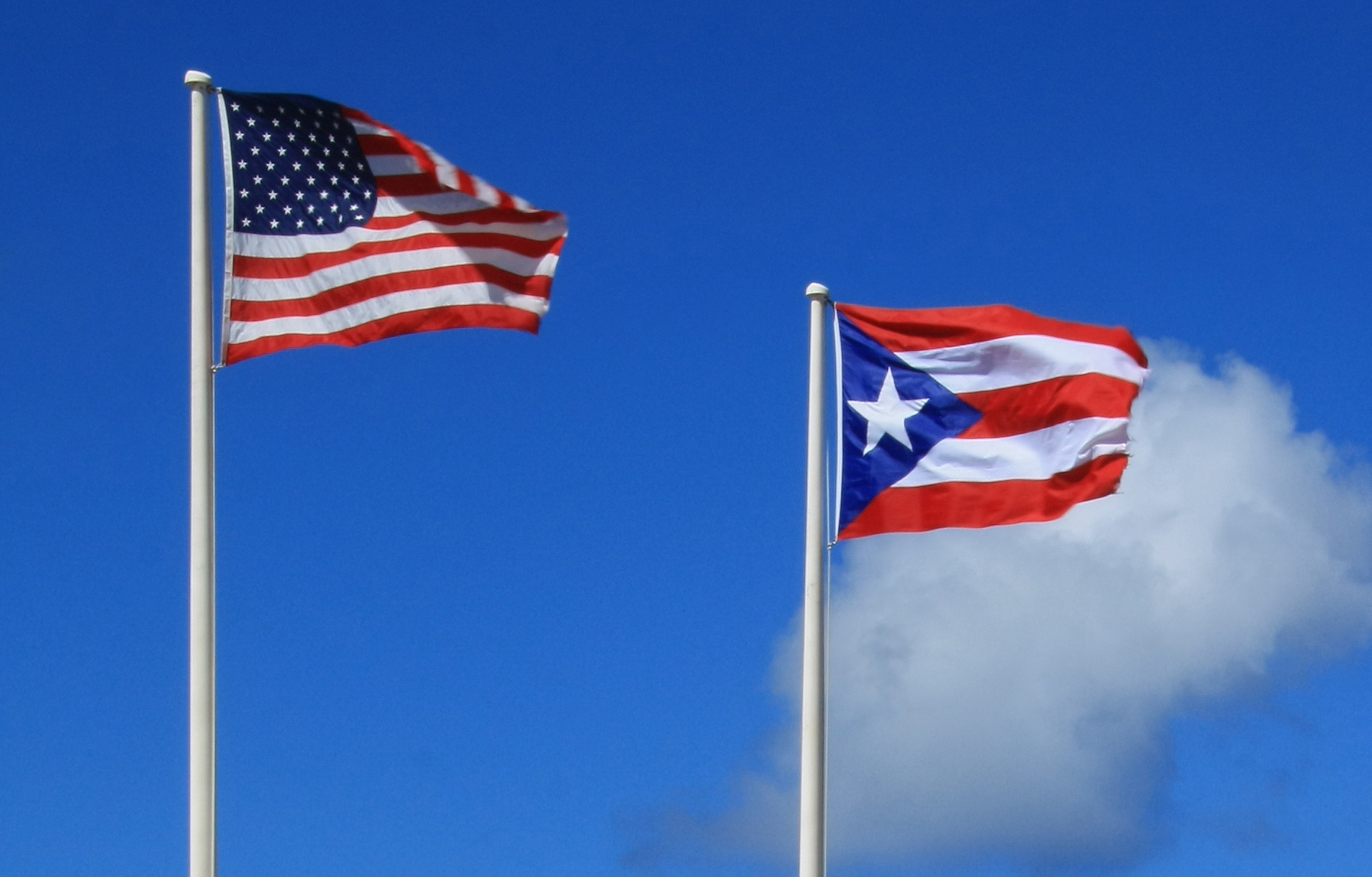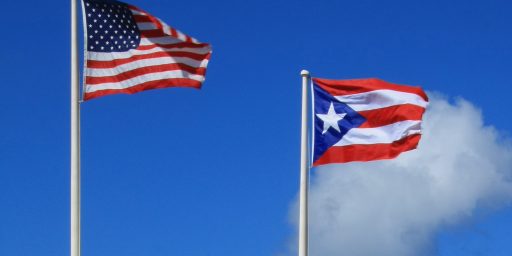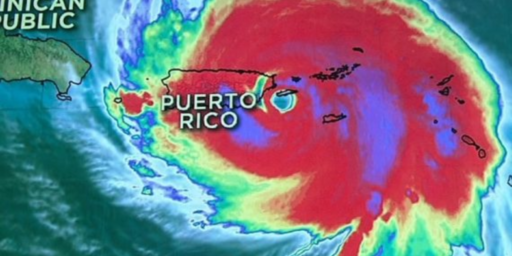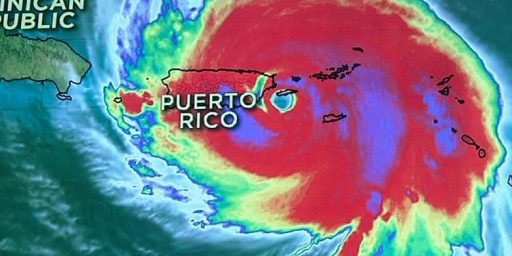Puerto Rico Votes Overwhelmingly For Statehood in Heavily Boycotted Referendum
Puerto Rican voters voted overwhelmingly for statehood yesterday in a referendum whose legitimacy is being questioned due to boycotts by opposition parties.
Yesterday, Puerto Rico held its fifth referendum in fifty years on the island’s status with the United States and, at least officially, the statehood option received an overwhelming amount of support. However, the results are tainted by the fact that the referendum was being boycotted by opposition parties that favor independence or maintaining the island’s current Commonwealth status:
SAN JUAN, P.R. — With schools shuttered, pensions at risk and the island under the authority of an oversight board in New York City, half a million Puerto Ricans voted overwhelmingly on Sunday to become America’s 51st state, in a flawed election most voters sat out.
With nearly all of the precincts reporting, 97 percent of the ballots cast were in favor of statehood, a landslide critics said indicated that only statehood supporters had turned out to the polls. Opposition parties who prefer independence or remaining a territory boycotted the special election, which they considered rigged in favor of statehood.
On an island where voter participation often hovers around 80 percent, just 23 percent of registered voters cast ballots. Voting stations accustomed to long lines were virtually empty on Sunday.
Puerto Rico’s governor, Ricardo A. Rosselló of the pro-statehood New Progressive Party, said he planned to take the victory to Washington and press Congress to admit Puerto Rico to the union.
“From today going forward, the federal government will no longer be able to ignore the voice of the majority of the American citizens in Puerto Rico,” he said in a brief televised speech after the voting results were announced.
But his political opponents who do not want statehood argued that heading to Congress with such lopsided results would actually hurt the governor’s cause.
“A 97 percent win is the kind of result you get in a one-party regime,” former Gov. Aníbal Acevedo Vilá said in an interview. “Washington will laugh in their faces.”
Puerto Rico has been a United States territory since 1898, when the island was acquired from Spain after the Spanish-American War. Sunday’s nonbinding referendum was the fifth time during Puerto Rico’s relationship with the United States that Puerto Ricans voted on their future. They have generally chosen from statehood, independence and remaining a territory.
But the process is usually marred, with ballot language phrased to favor the party in office. In 1998, “none of the above” was the top winner. In 2012, 61 percent of counted votes went to statehood — and half a million ballots were left blank.
But this time, the vote came a few weeks after Puerto Rico declared a form of bankruptcy in the face of $74 billion in debt and $49 billion in pension obligations it cannot pay. More than 150 public schools are being closed as a mass exodus of Puerto Ricans head for the mainland and those who remain brace for huge cuts to public services. Decisions are now in the hands of a bankruptcy judge.
Voters said that Puerto Rico needed the United States now more than ever.
“If there’s an earthquake in Puerto Rico, who is going to send the help? The Americans! This is their land!” said Gladys Martínez Cruz, 73, a retired tax clerk in San Juan’s Barrio Obrero neighborhood. “We need someone who is going to support us, send us money. There’s a lot of hunger in Puerto Rico, even with the help we get.”
Many Puerto Ricans, like Ms. Martínez, live off food stamps, public housing vouchers or other federal programs and worry that a change in political status could affect that aid. A huge publicity campaign warned voters that their citizenship could be at risk.
“I want my children and grandchildren to keep their American citizenship,” said Maira Rentas, a cardiac nurse in San Juan. “Little by little, with whatever votes we get, we have to try to become a state.”
Ana Velázquez, 50, a hospital secretary, said Puerto Rico’s economic problems were so great that they overshadowed other considerations, such as the language, culture and identity that could be lost if the island became a state.
“I don’t want to lose my hymn, my coat of arms, my flag. My beauty queen would no longer be ‘Miss Puerto Rico,'” Ms. Velázquez said. “I don’t see myself ever singing the United States national anthem. I really don’t. But Puerto Rico is in really bad shape, and it needs help.”
So she arrived at the same conclusion as many other Puerto Ricans: She did not vote.
Héctor Ferrer, the head of the Popular Democratic Party, which had urged a boycott, emphasized that eight out of 10 Puerto Rican voters chose to spend the day at church, on the beach or with their families. He argued that the governing party had manipulated the ballot language and even election law to fix the results.
“It was rigged, and not even with trickery could they win,” Mr. Ferrer said.
The ballot option asked voters who wanted to remain a United States territory to say they wished for Puerto Rico to stay “as it is today, subject to the powers of Congress.”
“The title of the law that made this plebiscite is ‘process to decolonize Puerto Rico,’ and one of the alternatives is ‘colony’ as defined by them,” Mr. Ferrer said.
Mr. Ferrer’s party complained about the ballot choices to the Justice Department, which withheld $2.5 million in funding for Sunday’s voting and had urged the Puerto Rican government to hold off until the ballot could be reviewed. Puerto Rico made changes but moved forward without money or approval from the Justice Department.
The election was pushed by the governing New Progressive Party, which has long advocated statehood for Puerto Rico.
(…)
Last week, Governor Rosselló signed a law intended to force Congress to act. He will appoint five representatives and two senators who will essentially show up in Washington and request to take their seats. Known as the Tennessee Plan, it worked there in 1796.
Many people in Puerto Rico doubt that Congress will be at all inclined to welcome a state that would have the highest unemployment and poverty rate in the nation. The White House declined a request to comment on Sunday’s vote.
“I think it’s a useless exercise, because we have seen that the Trump administration and Congress have not showed the slightest interest in the process itself, much less the will of the people of Puerto Rico,” said Nestor Duprey, a political analyst here.4
The starkest indication of just how unrepresentative yesterday’s referendum was can be found in the voter turnout numbers for the vote compared to those for past referenda. The most recent referendum prior to yesterday was held five years ago in 2012. That vote brought more than 1.5 million people to the polls and returned a result where a slight majority voted “No” on maintaining the island’s current status and 60% voted in favor of statehood in a second question that asked voters to choose between three non-Commonwealth alternatives. The 1998 referendum similarly saw more than 1.5 million voters participate in a vote that asked voters to choose between four options plus “None of the Above,” a vote which “None of the Above” won with 50% of the vote, followed by statehood with roughly 46% of the vote. A referendum held in 1993 saw more than 1.7 million people turn out for a vote in which maintaining Commonwealth status narrowly beat out statehood. Finally, the very first status referendum, which took place in 1967, drew more than 700,000 people to the polls, a number which represented nearly 66% of the population. By contrast, yesterday’s vote saw just slightly more than 500,000 people turn out to participate, a turnout rate of just 23%.
As I noted last week, Congress is not likely to act on this latest referendum or express any interest in granting Puerto Rico statehood any time in the near future. Part of the reason for this, of course, is political and rooted in the fact that any Congressional and Senate representation that a “State of Puerto Rico” would send to Washington would be overwhelmingly Democratic. This isn’t an unusual response to statehood petitions that Congress has received over the past two centuries. On more than one occasions, political forces in Washington were able to successfully block statehood applications based on the fact that the proposed state would result in one major party or the other benefiting from the addition to the Union. Additionally, there has been more than one example of two states being admitted at roughly the same time. The most notable times this happened, of course, was in the 19th Century when the statehood applications of several states butted heads with the issue of the expansion of slavery. This resulted in laws such as the Missouri Compromise and the Kansas-Nebraska Act. There were also political motivations behind the admission of Alaska and Hawaii in 1959. In addition to the political concerns, the current financial status of Puerto Rico makes the admission of the island as a state unlikely for the time being. As it stands, Puerto Rico already receives considerable financial assistance from the Federal Government. Statehood would increase that significantly, as would the fact that the combination of Puerto Rican representation in Congress would likely combine with representatives from states with large Puerto Rican populations to push through increased aid to the island.
Added to all of those reasons why it’s unlikely that this referendum will prompt Congress to act is the fact that it is clearly not an accurate representation of the opinion of the Puerto Rican public. The mere fact that total voter turnout was the lowest for any previous status referendum, including the first one in 1967 when the island’s population was markedly smaller than it is today is sufficient reason to doubt that what we see in these results is anything other than a one-sided result that just happens to favor the position of the governing party. This is not the kind of popular support for statehood that Congress has traditionally demanded before even considering a statehood application. As a result, this referendum will have the same impact as the previous four, and will likely go down as the least legitimate of the five that have been conducted over the past fifty years. This means, of course, that Puerto Rico will maintain its current status for the time being, and that we’ll likely see another referendum five or ten years in the future.
Photo via Wikimedia Commons under Creative Commons License. Originally posted to Flickr as BANDERAS DE PUERTO RICO Y USA ONDEANDO





With all the money problems Puerto Rico has they thought it was smart to waste time and money on this?
Yeah…I can see the Racist Caucus granting them statehood…never.
@Daryl’s other brother Darryl:
There would also likely be many Democrats opposing statehood, especially in the Senate where admission would result in two more Senators and dilution of the voting impact of smaller states.
@Daryl’s other brother Darryl:
Also, as I note in the post the admission of states to the Union has *always* had a political aspect to it. There’s no rational reason for Republicans to consent to admission. Additionally given P.R.’s financial status and the fact that it is poorer than even the poorest of the current 50 states and the cultural differences between the island and the rest of the U.S., admission at this time seems inadvisable.
Their next step seems like it would be clear – just migrate, en masse, to the mainland.
Preferably to red states – where their presence would dramatically skew the electorate.
@HarvardLaw92:
That’s been happening in Florida, which has the advantage of a climate not dissimilar from the island. As a result, Puerto Ricans are becoming a larger share of the state’s Latino population than Cubans.
Which of Trump’s advisors do you suppose took it upon him or herself to inform the president that Puerto Rico isn’t a furrin country?
I predict that Washington DC will get Federal representation before Puerto Rico becomes a stste.
To be fair, “we want to become a state so we can financially collapse more efficiently” isn’t the best argument for statehood.
Granted that colonialism is always a losing game still the U.S. has done a ‘below grade average’ job in PuertoRico.
@CSK: I don’t know who, but I know when. It was right after he asked to build a wall between Florida and Puerto Rico.
To be fair to the current administration, there are lines in West Side Story about Puerto Ricans being told to go back to their native country. The citizenship status of its people is hardly a new source of confusion to ‘Muricans.
OT, but Sessions’s testimony before the Senate Intelligence Committee tomorrow will be public.